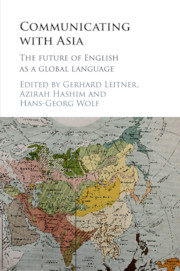Book contents
- Communicating with Asia
- Communicating with Asia
- Copyright page
- Contents
- Figures
- Tables
- Contributors
- Book part
- Communicating with Asia: introduction
- Part I English in selected regional and national habitats with a glance at the role of outward-bound communication needs
- Part II Major other languages in Asia, their international status and impact on education
- Part III Wider perspectives
- 16 Understanding Asia by means of cognitive sociolinguistics and cultural linguistics – the example of ghosts in Hong Kong English
- 17 Understanding Asia through English literature
- 18 English as a lingua franca and educational impact in Asia
- 19 The Australian Asia project
- Bibliography
- Index
19 - The Australian Asia project
from Part III - Wider perspectives
Published online by Cambridge University Press: 05 January 2016
- Communicating with Asia
- Communicating with Asia
- Copyright page
- Contents
- Figures
- Tables
- Contributors
- Book part
- Communicating with Asia: introduction
- Part I English in selected regional and national habitats with a glance at the role of outward-bound communication needs
- Part II Major other languages in Asia, their international status and impact on education
- Part III Wider perspectives
- 16 Understanding Asia by means of cognitive sociolinguistics and cultural linguistics – the example of ghosts in Hong Kong English
- 17 Understanding Asia through English literature
- 18 English as a lingua franca and educational impact in Asia
- 19 The Australian Asia project
- Bibliography
- Index
Summary
The Australian project of accommodation to the Asia-Pacific region as the dynamic centre of the world’s economy can now be dated in decades. Successive Federal and State governments have focused on shifting the national consciousness from its predominant, inherited Western cultural dispositions, towards Asia. Driven by the overriding concerns of trade and economic relations, more than $400 million of additional funding has been invested in the prioritization of Asia studies and Asian languages, with considerable additional resources for research, cultural studies, exchanges, etc. Policies and funding have endeavoured to dramatically increase Australia’s ‘Asia literacy’ to aid economic engagement with what has come increasingly to be called ‘the region’ or ‘our region’. All major political configurations adhere to the broad outlines of such engagement, lending the entire endeavour a sense of inevitability; so much so that there is little problematizing of the educational consequences of the shift of economic power from the ‘West’ to the ‘East’. However, despite ambitious plans and substantial funding, Asian language policies have consistently fallen short of targets. This chapter discusses some intricacies involved in formulating an Asia-prioritizing agenda, referring to the wider communication ecology. Language policies must acknowledge the pluralization of modern forms of communication as well as the emergence of multiple cultural and linguistic identities in the transnational reality of contemporary society. The Australian experience highlights the importance of crafting Asia-focused policies within a wider framework of comprehensive language planning (Lo Bianco 2010), that values existing cultural and linguistic diversities, as well as envisioned ones, along with a pragmatic sense of the limits to what can be asked of school knowledge in relation to trade and diplomatic petitions.
- Type
- Chapter
- Information
- Communicating with AsiaThe Future of English as a Global Language, pp. 296 - 312Publisher: Cambridge University PressPrint publication year: 2016
- 8
- Cited by



